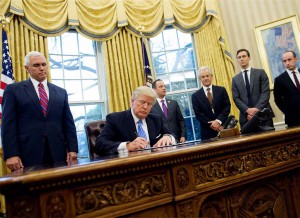The bill repealing the auto-lending guidance from the Consumer Financial Protection Bureau, revoking a Obama administration rule that was put in place to protect minority customers from predatory practices has been signed by President Donald Trump
Trump’s signature on the congressional resolution erases the CFPB’s 2013 guidance targeting “dealer markups,” the additional interest that is added to a customer’s third-party auto loan as compensation for the dealer, according to The Hill, a newsletter that follow Congress.
The Hill reported the president signed the resolution in a private White House signing ceremony.
Auto dealers, led by the National Automobile Dealers Association, banks and their allies in Congress said the CFPB policy was an unfair and unfounded attack on an essential and harmless financing tool.
(Senate strikes down rule protecting against predatory lending. Click Here for the story.)

NADA, led by Chairman Wes Lutz, applauded the reversal of CFPB guidance over potentially discriminatory lending practices.
Trump’s signature also caps off an unprecedented use of congressional authority, as lawmakers had never before passed such a resolution to revoke informal guidance from a federal agency. The bill cleared the House earlier this month after clearing the Senate in April.
The CFPB took aim at dealer markups in 2013. Under former Director Richard Cordray, the CFPB warned auto dealers that the use of markups on third-party loans could lead to a lawsuit from the agency under anti-lending discrimination laws.
(Click Here for more about auto dealers rejecting a federal plan for a single interest rate.)
The CFPB and fair lending advocates have pointed to several studies, including one that was conducted by the bureau, that found racial disparities in dealer markups. Those studies found that minority customers often paid higher dealer markups than white customers with similar credit profiles.
While the 2013 guidance was not a formal rule, the CFPB used the policy to launch a slew of lawsuits against automakers and lenders it said violated fair credit laws with discriminatory markups. The CFPB and Justice Department sued Ally Financial in December 2013 for close to $100 million in fines and damages, and also sued Honda and Toyota for tens of millions of dollars over similar charges.
(Auto dealers cheer CFPB ruling. Click Here for the story.)
Opponents of the rule questioned the methodology behind the studies that showed discriminatory markups and accused the CFPB of exploiting a loophole to circumvent its lack of jurisdiction over the auto industry.

